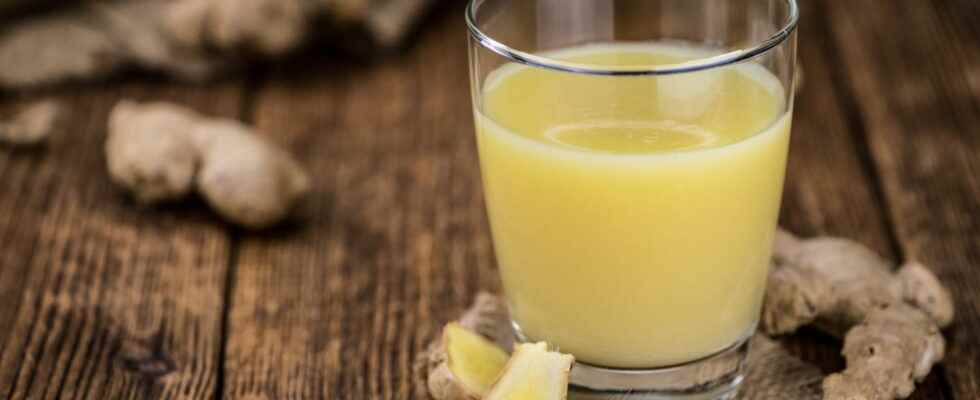Rich in caffeine, for example, certain drinks are stimulating and can help fight fatigue. Which are the most effective? What about energy drinks such as Red Bull?
Need a boost? What drinks do you prefer? Those that contain caffeine ? Of the theine ? From juice ginger ? Or just a drink energizing like Red Bull? But isn’t it dangerous for the heart? Practical advice with Dr Marie-Antoinette Séjean, nutritionist.
“”Anti-fatigue” drinks are drinks that are supposed to be stimulating thanks to their content and ingredients”, defines Dr Marie Antoinette Séjean, nutritionist. Two types can be distinguished:
→ Non-natural drinks called “energy drinks” by the food industry. “The basis of these drinks is water, often carbonated, very rich in sugars (glucose, fructose) – which are an immediately available energy substrate – sometimes up to nine sugars for a 250 ml can !” To this water have been added caffeine, group B vitamins (those of energy metabolism), trace elements, taurinea product derived from amino acids or plant extracts (guarana, ginseng).
→ natural drinks : “These are drinks that are not processed such as coffee, tea, mate, matcha or even some juice.”
There are several scenarios:
→ Either the person is sensitive to caffeine : when tolerated, caffeine is not discouraged in natural form. However, the consumption of commercial caffeine-based drinks must be controlled: “Drinking an energy drink is swallowing the equivalent of a very sweet coffee with, in addition, often taurine to boost and make the effect of caffeine more durable.”
→ Either the person is not sensitive to the stimulating action of caffeine : “In some, caffeine can be poorly assimilated and in others, it can even cause anxiety because it decreases the bioavailability of magnesium. In these cases, rather, you should consume natural drinks that do not contain caffeine and are rich in polyphenols, such as ginger, juices rich in vitamin C.”
These energy drinks have an anti-fatigue action if the person feels boosted by the stimulating action of caffeine. However, they can present several risks. They are often consumed with alcohol and “this mixture acts as a real detonator which can induce overconsumption of alcohol because the state of fatigue is masked by caffeine. This can lead young consumers to underestimate their alcohol level and even lead to alcoholic comass” alert the nutritionist. “Very high in caffeine, overconsumption of energy drinks such as Red Bull can also cause palpitationschest pain, hypertension, headache and insomnia, irritability.”
Commercial energy drinks should be taken with food.
“All drinks naturally rich in caffeine allow you to benefit from their hyperstimulant effects on the central nervous system which activate vigilance and therefore reduce the feeling of fatigue” says the nutritionist. The naturally anti-fatigue drinks are:
- Coffee : “Caffeine is a psychostimulant molecule, hence more dynamism.”
- Tea : “Rich in polyphenol-type antioxidants, its action is smoother and longer than that of coffee because the tannins release the theine (or caffeine) gradually.”
- Mate : “A very common drink in South America, also called Paraguayan tea. With less caffeine than coffee but more than tea, mate is a superfood, rich in minerals and vitamins, which offers a more constant energy than that of coffee, which lasts throughout the day.”
- Homemade juices : “It is also possible to make homemade juices that combine the richness of natural vitamin C and the invigorating effect of ginger, known to stimulate the body and strengthen immunity through its richness in micronutrients.”
Dr Marie-Antoinette Séjean shares her recipe for anti-fatigue juice, “it is made with water, citrus fruits, ginger and honey.” Ingredients for half a liter of mineral water:
- juice of 2 very juicy limes
- juice of 1 very juicy lemon
- the juice of half an orange
- 1 finger of ginger, thinly sliced
- 3 teaspoons of honey: “It is possible to replace the honey with a sweetener for a more “boosting” effect and to replace the mineral water with cold tea.”
→ The commercial energy drinks should ideally be taken with food : “Consumption of industrial energy drinks outside meals can quickly become addictive” warn the nutritionist. Why ? “Their very high intake of sugars, glucose and fructose cause the blood sugar level to rise very quickly, resulting in a high secretion of insulin, a source ofreactive hypoglycaemia… Hence the desire to consume it again.” According to the nutritionist, it is also preferable to avoid them in the evening unless looking for hyper activity like the night owls who often mix them with alcohol in a nightclub.
→ If you consume a natural anti-fatigue drink such as coffee, tea or juice, “they can drink between meals if they are not too sweet.”
→ If the person is very or even too stimulated by the intake of caffeine, “it is best to drink these drinks at the start of the day.”
“Because of their high caffeine content, commercial energy drinks are not recommended for children and pregnant or breastfeeding women. For other people, they should be consumed in moderation because they maximize and mask the effects of alcohol or can cause palpitations, hypertension, headaches and insomnia in particular. warns Dr Séjean.
Thanks to Dr Marie-Antoinette Séjean, nutritionist doctor.
